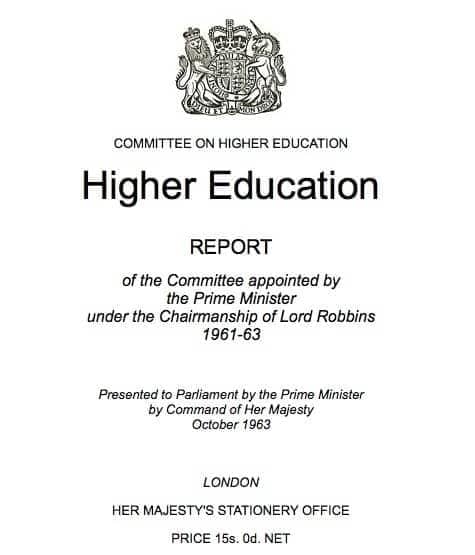The all new higher education game.
Inspired by the recent Rewriting Robbins conference I thought it would be fun to create a new game to mark the 50 years since the publication of the Robbins report (any resemblance to any silly games popularised by radio’s favourite daft duo, Mark and Lard, is entirely coincidental). So, use your skill and judgement to decide which of the following passages are actually from the mighty Robbins report and which are not. So, which are:
Robbins?

And which are bobbins?

Answers at the bottom of the page…
Passage 1
The organisation of higher education must allow for free development of institutions. Existing institutions must be free to experiment without predetermined limitations, except those necessary to safeguard their essential functions; and there must be freedom to experiment with new types of institution if experience shows the desirability of such experiments.
Passage 2
We have inherited institutions of very different sizes, with different strengths, different patterns of participation, different offerings by level and subject of study, different local, regional and national orientations, different legal status and governance arrangements and different histories. Some are of very recent origin; some are ancient foundations; most owe no allegiance to any particular group in society; others are church foundations. All of these factors influence the pattern of institutional provision and the institutions’ individual and collective characters and strategic aspirations.
Passage 3
Quite rightly our education system is envied on many levels, stretching beyond our academic excellence. Other countries are attracted to the expertise that UK institutions and organisations can offer on governance models, on professional development and curricular design, on construction, on the international reputation of our qualifications and on management and finance. The attraction also extends to the innovative equipment and technology solutions that our educational suppliers are constantly developing. But the UK can also learn from others. Countries like India quite rightly want a reciprocal partnership with the UK based upon shared values and mutual respect.
Passage 4
Students should be expected to spend a substantial part of their vacations on work related to their fields of study. Guidance on how best to use the vacations should be given by the institutions in which they are studying, and evidence that the time has been used to good purpose should be required.
Passage 5
Halls of residence in the traditional sense, where some teachers also live, and where teachers and students dine together, have common rooms and other social facilities, are expensive and they are not necessarily desirable for all students. Halls of residence provide a sense of real community; but to some students they may seem unduly restrictive.
Passage 6
Our visits overseas suggest that, in the long term, other nations will increase their investment in higher education to sustain their economies. There is some emerging economic evidence to support such an approach. First, that countries which are the first to develop new research and technology capabilities gain a long term advantage over their competitors. Secondly, that ‘the weight of evidence is increasingly that education is positively associated with income growth and higher education seems to be the most relevant educational variable in more developed countries’. As a matter of economic strategy, we must match international levels of investment to anticipate and respond to the changing structure of the international and national economy.
Passage 7
It is the essence of higher education that it introduces students to a world of intellectual responsibility and intellectual discovery in which they are to play their part. They have to be taught techniques and methods and acquire a corpus of relevant knowledge; but, more important, they have to be inspired to learn and to work. The element of partnership between teacher and taught in a common pursuit of knowledge and understanding, present to some extent in all education, should become the dominant element as the pupil matures and as the intellectual level of work done rises.
Passage 8
In some universities postgraduate students may be a further potential source of assistance in informal teaching and the conduct of discussion groups. At present about half of all students in courses leading to Ph.D. degrees do some teaching, the proportion being much higher in science than in arts.† There are obvious dangers here both for the postgraduate, who requires all the time he can find for his own work, and for the undergraduate, who should not be dependent on inexperienced teachers. But with proper safeguards and with proper departmental supervision a small amount of teaching is good for some postgraduates, and would give them an introduction to university teaching. Further, undergraduates may benefit from being taught by those who have recently passed along the same way.
Passage 9
In the professions, the UK’s institutions, such as its accountancy bodies, command worldwide respect for their roles in setting standards of entry to the professions and for professional development, covering ethical as well as technical standards. The qualifications offered by UK professional bodies are seen as benchmark standards in countries around the world. These qualifications are valued by business and governments for the depth and breadth of finance and business skills they teach, and by students because they open a wide range of international career opportunities.
Answers below:
.
.
.
.
.
Passages 1, 4, 5, 7 and 8 are from the Robbins Report
Passages 2, 3, 6 and 9 are Bobbins – 3 and 9 are from the BIS report International education strategy: global growth and prosperity and 2 and 6 are from the Dearing Report.










